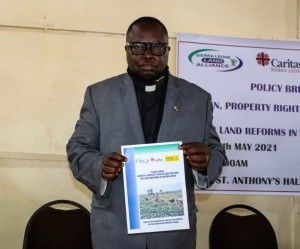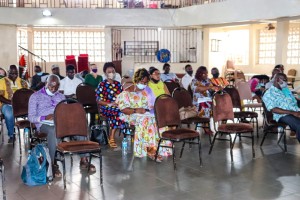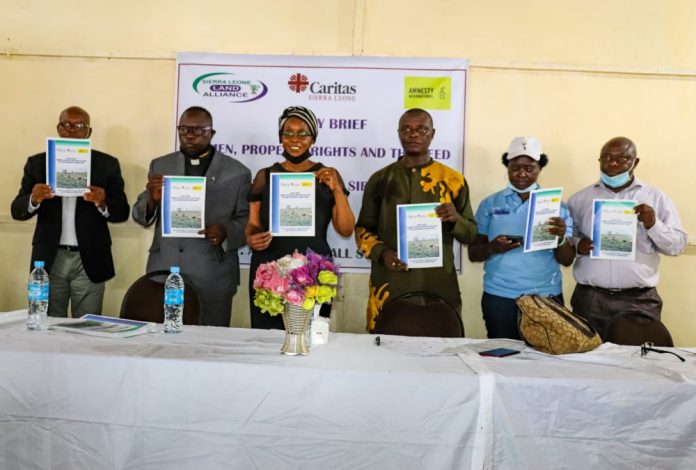By Foday Moriba Conteh
As part of their strides to intensify advocacy on women, property rights and the need for land reforms in the country, Caritas Freetown, in collaboration with their partners, has on Thursday 20th May, 2021 held its 3rd Policy Brief of Sierra Leone Land Alliance dubbed: “Women, Property Rights and the need for Land Reforms in Sierra Leone” at the Saint Anthony’s Hall on Skye Street in Freetown.
In his welcome address, the Executive Director of Caritas Freetown, Rev Fr. Peter A. Konteh, extended gratitude to all for attending the 3rd Policy Brief of the Sierra Leone Land Alliance dubbed: “Women, Property Rights and the need for Land Reforms in Sierra Leone’’.
He stated that working on sustainability issues through the lens of land is key to finding integrated and long-lasting solutions to reducing poverty and boosting shared prosperity, which according to him are the two corporate goals for Caritas Sierra Leone and partners.
Rev Fr. Peter A. Konteh pointed out that the Policy Brief session will provide an opportunity to develop a comprehensive action plan to engage law and policy makers at the local, national and regional levels and the affected communities, adding that the event is a platform for discussing a corporate driven development narrative, enhance advocacy for sustainable use of land resources, strengthening a link among various faith-based organizations, civil society groups, and the media in addressing the problem of land grabbing and its effects.
He revealed that at the Sierra Leone Land Alliance, Caritas Sierra Leone and Amnesty International, are supporting Government’s policies that recognize and record all forms of legitimate tenure, while paying particular attention to the land rights of women and indigenous people and supporting the strong land governance policies and institutions that can help prevent large-scale land acquisition or mitigate its negative impacts.
In his presentation on the 3rd Policy Brief on Women, Property Rights and Land Reforms, Director of the Sierra Leone Land Alliance, John Paul Bai, disclosed that land is the foundation of all human activities both social and economic. He said that is particularly so in agrarian economies such as Sierra Leone.
“In these economies women are central to economic production in agriculture and livestock sectors,” he pointed out.
He added that women’s right to land is a critical factor in social status, economic well-being and empowerment. Land is a basic source of livelihood providing employment, the key agricultural input, and a major determinant of a farmer’s access to other productive resources and services.
“Land is also a social asset, crucial for cultural identity, political power and participation in local decision-making process,” he informed.
In his policy recommendations, John Paul Bai said Government should conduct a sustained advocacy on land rights in an attempt to address the negative cultural practices and attitudes that marginalize women stating that such has been proposed in the National Land Policy of 2015.
“Land is a fundamental asset for the economic empowerment of the poor. Women’s land rights should be treated as fundamental human rights. Women have been systematically marginalized from full participation in the development process despite their active participation in the production process alongside men,” he concluded.
Delivering a statement on why do women’s Land Rights Matter, Director of Gender and Children’s Affairs, Human Rights Commission, Gloria Bayoh, noted that human rights are enshrined in the law and protected by the State that is why they remain very crucial to have issues on women’s land rights rooted in the law for protection, and make access legally binding and thus removing all discriminatory aspects that prevent women from acquiring land as a personal property.
He said that women’s Land Rights matter because land rights are human rights and because they are human rights it simply means that everyone is entitled to it and should be enjoyed by all without any form of discrimination.
She pointed out that the survival of women in Africa are mostly characterized by subsistence farming to provide for their families especially children of which she said taking land from them means depriving the home, furthering that it is very obvious that women, just like men do have rights to own property especially land for their survival.
Assistant Representative of FAO, Harding Wuyango, disclosed that people can be condemn to a life of hunger and poverty if they lose their tenure rights of their land, fisheries and forests and their lives because of corrupt practices if implementing agencies fail to protect their internal rights.
He, however, noted that in May, 2012, the Committee on Food Security endorsed voluntary guidelines on the responsible governance of tenure of rights, fisheries and forests in the context of national food security, VET and all member State made a commitment to implement them of which he said the Government of Sierra Leone made high commitment towards the implementation of the VET.
Harding Wuyango said that upon the commitment made by Government FAO supported the development and implementation of the 2015 land policy, adding that they also established a vibrant multi-stakeholders’ platform to support the coordination of the VET and they also piloted the systematic demarcation and mapping of customary land rights.
The event was climaxed by an official launch of the 3rd Policy Brief on Women, Property Rights and Land Reform in Sierra Leone by Professor Joe Turay of which he also highlighted the need for land reforms in the country followed by Audience Participations/Q&A.






